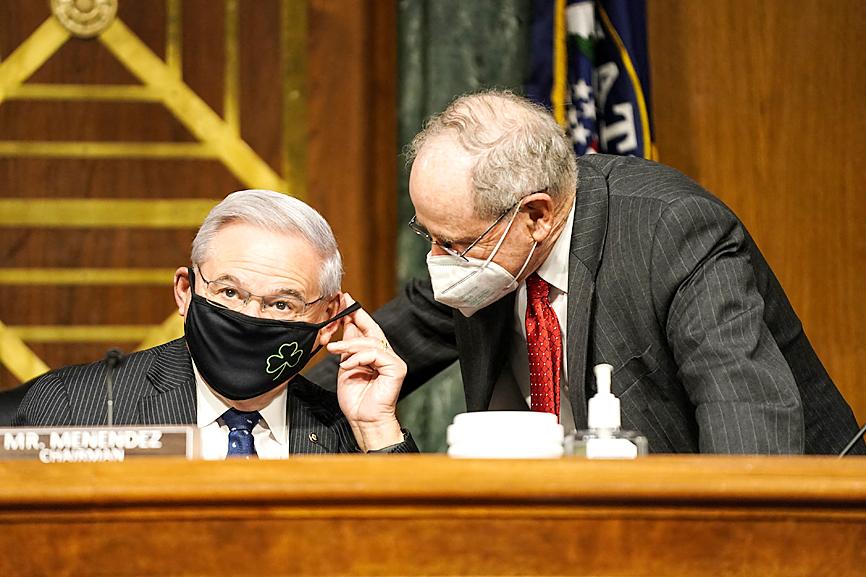US senators on Thursday unveiled broad legislation on China that would step up pressure over Beijing’s alleged theft of intellectual property and solidify US ties with Taiwan.
In a rare bipartisan initiative in the polarized US Congress, the top Democrat and Republican on the Senate Foreign Relations Committee together presented the strategic competition act, which aims to govern the fraught US relationship with Beijing.
“The United States government must be clear-eyed and sober about Beijing’s intentions and actions, and calibrate our policy and strategy accordingly,” said US Senator Bob Menendez, the Democrat who leads the committee.

Photo: AFP
The act describes sanctions as “a powerful tool” for the US and voices concern that the executive branch “has not fully implemented” measures already approved by Congress.
If passed, the act would require the secretary of state to issue an annual list of all Chinese state-owned companies that have benefitted from intellectual property theft that hurt any US company or sector.
It would also reaffirm strong US support of Taiwan, which has historically enjoyed wide bipartisan backing in Congress.
The legislation would require the US to use “the same nomenclature and protocol” in dealing with Taiwan as with any foreign government, although it would maintain that Washington recognizes only Beijing.
The US must retain “credibility as a defender of the democratic values and free-market principles embodied by Taiwan’s people and government,” the act said.
It would also seek assessments on rape, forced abortion and other gender-based violence against Uighurs, in addition to previously required reporting on incarceration and other mistreatment of the mostly Muslim people.
Rights experts say that more than 1 million Uighurs and other minorities have been rounded up in the western region of Xinjiang in a campaign the US describes as genocide.
Beijing says that it is providing vocational training to reduce the allure of Islamic extremism. Beijing also denies US allegations of rampant theft of intellectual property.

Right-wing political scientist Laura Fernandez on Sunday won Costa Rica’s presidential election by a landslide, after promising to crack down on rising violence linked to the cocaine trade. Fernandez’s nearest rival, economist Alvaro Ramos, conceded defeat as results showed the ruling party far exceeding the threshold of 40 percent needed to avoid a runoff. With 94 percent of polling stations counted, the political heir of outgoing Costa Rican President Rodrigo Chaves had captured 48.3 percent of the vote compared with Ramos’ 33.4 percent, the Supreme Electoral Tribunal said. As soon as the first results were announced, members of Fernandez’s Sovereign People’s Party

MORE RESPONSIBILITY: Draftees would be expected to fight alongside professional soldiers, likely requiring the transformation of some training brigades into combat units The armed forces are to start incorporating new conscripts into combined arms brigades this year to enhance combat readiness, the Executive Yuan’s latest policy report said. The new policy would affect Taiwanese men entering the military for their compulsory service, which was extended to one year under reforms by then-president Tsai Ing-wen (蔡英文) in 2022. The conscripts would be trained to operate machine guns, uncrewed aerial vehicles, anti-tank guided missile launchers and Stinger air defense systems, the report said, adding that the basic training would be lengthened to eight weeks. After basic training, conscripts would be sorted into infantry battalions that would take

EMERGING FIELDS: The Chinese president said that the two countries would explore cooperation in green technology, the digital economy and artificial intelligence Chinese President Xi Jinping (習近平) yesterday called for an “equal and orderly multipolar world” in the face of “unilateral bullying,” in an apparent jab at the US. Xi was speaking during talks in Beijing with Uruguayan President Yamandu Orsi, the first South American leader to visit China since US special forces captured then-Venezuelan president Nicolas Maduro last month — an operation that Beijing condemned as a violation of sovereignty. Orsi follows a slew of leaders to have visited China seeking to boost ties with the world’s second-largest economy to hedge against US President Donald Trump’s increasingly unpredictable administration. “The international situation is fraught

GROWING AMBITIONS: The scale and tempo of the operations show that the Strait has become the core theater for China to expand its security interests, the report said Chinese military aircraft incursions around Taiwan have surged nearly 15-fold over the past five years, according to a report released yesterday by the Democratic Progressive Party’s (DPP) Department of China Affairs. Sorties in the Taiwan Strait were previously irregular, totaling 380 in 2020, but have since evolved into routine operations, the report showed. “This demonstrates that the Taiwan Strait has become both the starting point and testing ground for Beijing’s expansionist ambitions,” it said. Driven by military expansionism, China is systematically pursuing actions aimed at altering the regional “status quo,” the department said, adding that Taiwan represents the most critical link in China’s